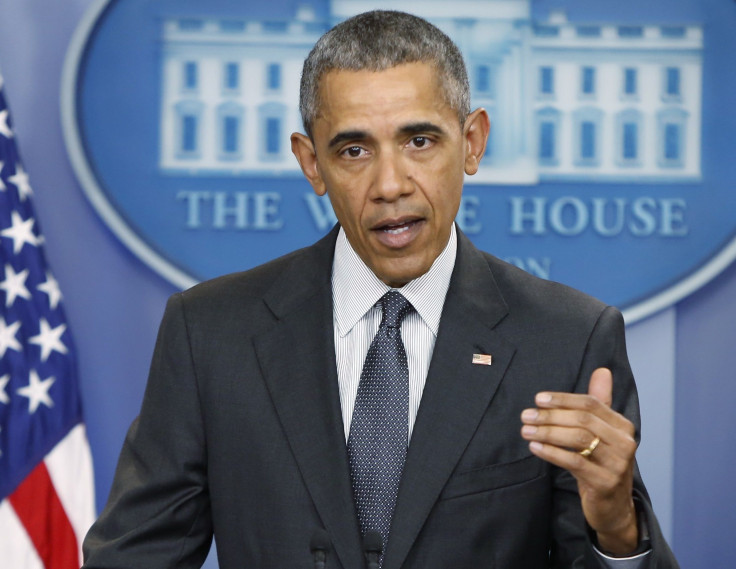Immigration Reform DAPA Updates: SCOTUS Obama Executive Action Challenge Gets Underway

UPDATE 1:38 p.m. EDT -- U.S. Supreme Court justices were seemingly split Monday as it considered U.S. President Barack Obama's high-profile 2014 executive action, Deferred Action for Parents of Americans and Lawful Permanent Residents or DAPA. According to Reuters, it raised the possibility of a 4-4 deadlock, which would block the program that would spare deportation and provide temporary work permits for up to 5 million undocumented immigrants.
Reuters came to the conclusion that a tie was possible following the 90 minute oral argument in the case Monday. The news service noted that the four liberal judges seemed likely to back Obama while the four conservative justices were more skeptical. Following the death February of conservative justice Antonin Scalia, the court is divided evenly ideologically. A 4-4 tie would leave in place a 2015 lower-court ruling that threw out the president's executive action after he bypassed a Republican Congress.
Demonstrators clash outside of #SCOTUS #DAPA #DACA pic.twitter.com/qOXfNOKIKn
— Clarece Polke (@clarepolke) April 18, 2016
The case, which puts Obama's divisive executive action up against 26 states, is led by Texas, which filed suit to block his immigration plan. Reuters reported that Chief Justice John Roberts, who would have to join the more liberal justices, is perhaps the best chance at avoiding a 4-4 deadlock.
The Supreme Court looks split over Obama's immigration plan: https://t.co/mVIQVtkVu1 pic.twitter.com/ATYd0Yhu8l
— Reuters Top News (@Reuters) April 18, 2016
UPDATE: 10:53 a.m. EDT -- U.S. Supreme Court justices have reportedly expressed doubt and questioned the legitimacy of President Barack Obama's 2014 Deferred Action for Parents of Americans and Lawful Permanent Residents, an executive action that would offer undocumented immigrants temporary relief from deportation and give temporary work permits to as many as 5 million people living in the country illegally.
Anthony Kennedy and John Roberts were among the judges in question at a Monday SCOTUS session involving a Texas case against DACA, Reuters reported.
Meanwhile, outside the Supreme Court building in Washington, protests and rallies ensued.
DAPA rally outside Supreme Court with many youth and staff from #LAYC #FightForFamilies @CNN @WashPostPR @TFCbooks pic.twitter.com/tgy3AaHAZ2
— Jason Whitney Biehl (@JasonWBiehl) April 18, 2016
The Star Spangled Banner, to the tune of mariachis, in front of the Supreme Court #DAPA #DACA pic.twitter.com/PYEYXL87KA
— Melvin Félix (@melvinjfelix) April 18, 2016
Chanting for Obama's #DAPA immigration program to win at the Supreme Court pic.twitter.com/ctDiRkeqay
— Joshua Adam Siegel (@SiegelScribe) April 18, 2016
"Stop separating families" -- advocates chant ahead of DACA/DAPA oral arguments in front of SCOTUS pic.twitter.com/fSHBm5QSfo
— igorvolsky (@igorvolsky) April 18, 2016
.@MaketheRoadNY in front of #SCOTUS singing & chanting for #DAPA #DACA the youth leading the way #FightForFamilies pic.twitter.com/EV4djCGK51
— Natalia Aristizabal (@NatyAristiBeta) April 18, 2016
HAPPENING NOW: TOP is in DC in front of the Supreme Court to defend DAPA and DACA! #FamiliesFightBack #sisepuede pic.twitter.com/DCGBVw1Ifo
— TXOrganizingProject (@OrganizeTexas) April 18, 2016
Several elected officials, including Illinois Sen Dick Durbin and New Jersey Sen. Bob Menendez, spoke in support of the president's executive actions during the rallies.
Thank you @SenatorDurbin for your role in establishing DAPA and your continued commitment. #UnfreezeDAPA #SCOTUS pic.twitter.com/CxRNgP5UJQ
— Fair Imm Ref4m Mvmnt (@Re4mImmigration) April 18, 2016
Thank you @SenatorMenendez for your support for unfreezing #DAPA and #ImmigrationReform pic.twitter.com/A6PDkbmG59
— Fair Imm Ref4m Mvmnt (@Re4mImmigration) April 18, 2016
Original story:
The immigration policies of U.S. President Barack Obama will have their day in the country’s highest court Monday when justices hear arguments about one of the president’s highest-profile — and divisive — executive actions.
The Supreme Court will consider Obama’s 2014 Deferred Action for Parents of Americans and Lawful Permanent Residents, which would offer undocumented immigrants temporary relief from deportation and give temporary work permits to as many as 5 million people living in the country illegally. The so-called DAPA program is the extension of a 2012 program initiated by the president that provided deportation relief to immigrants who were brought to the country when they were young.
Demonstrations outside of the U.S. Supreme Court building in Washington are expected to draw thousands from across the country. As many as 30 undocumented mothers were fasting outside the court over the weekend to bring attention to their plight.
The recent death of Supreme Court Justice Antonin Scalia could lead the court to a 4-4 tie among the justices, which would leave lower court injunctions in place and likely put a freeze on the immigration policy for the remainder of Obama’s time in office. A tie would mean that the most important issues at hand would not be decided and states that favor the immigration policies could then sue again to reverse the injunction.
The deportation reprieves are being challenged by the state of Texas, which has based its argument against DAPA on the financial burden providing drivers’ licenses (which cost $25 each for individuals but are subsidized by some $130 from the state) to immigrants would impose, according to the Houston Chronicle. On the other side of the issue are some high-profile pro-immigrant groups and advocates who have been mobilized around the issue, including Facebook co-founder Mark Zuckerberg and LinkedIn co-founder Reid Hoffman. The technology industry frequently employs foreign workers and many tech companies are started by immigrants themselves.
© Copyright IBTimes 2024. All rights reserved.












